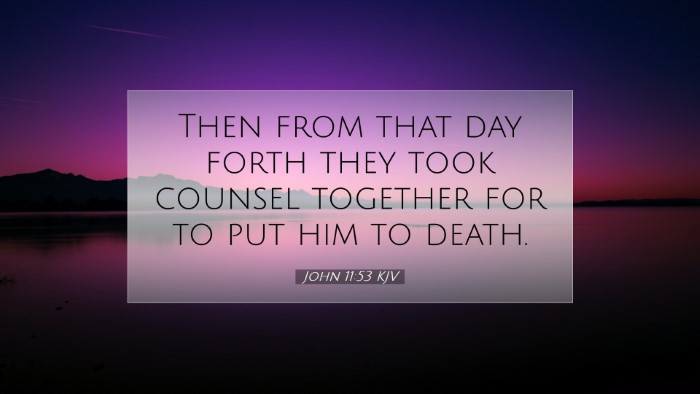Commentary on John 11:53
Verse Reference: John 11:53 - "Then from that day forth they took counsel together for to put him to death."
Introduction
This pivotal verse in the Gospel of John marks a significant turning point in the narrative surrounding Jesus' ministry. It not only heralds the malicious intent of the religious authorities but also sets in motion the events leading to the crucifixion. Understanding this verse through the commentaries of respected theologians provides rich insights into the motivations, implications, and theological significance of this moment.
Contextual Background
The verse follows the miraculous raising of Lazarus, creating a powerful testament to Jesus’ divine authority and compassion. This miracle not only draws many to believe in Him but also incites fear and resentment among the Jewish leaders.
Matthew Henry's Perspective
Matthew Henry points out that this verse reveals the culmination of the Jewish leaders' conspiracy against Jesus. The miracle of raising Lazarus served as a tipping point, prompting the chief priests and Pharisees to seek a plot against Him:
- Fear of Loss of Authority: The Jewish leaders feared that Jesus’ influence would undermine their authority and the stability of their position within Roman governance.
- Satanic Influence: Henry notes that the counsel to put Jesus to death indicates the workings of satanic malice, illustrating the struggle between light and darkness.
- Fulfillment of Prophecy: He emphasizes that this was not merely a human plot but part of God’s sovereign plan, aligning with prophesied events of the Messiah's suffering.
Albert Barnes’ Analysis
Albert Barnes elaborates on the motivations of the religious leaders. He suggests that they were not just reacting to fear, but were also blinded by jealousy and pride:
- Jealousy of Jesus’ Popularity: The masses were increasingly attracted to Jesus, and the leaders felt their influence waning. This jealousy drove them to drastic measures.
- Blinded by Legalism: Barnes highlights how their strict adherence to the law led them to commit grave injustices, mistaking their zeal for God’s will as justified actions against Jesus.
- Political Calculations: He illustrates that their determination to preserve the status quo was instrumental in their decision to eliminate Jesus, thereby protecting their influence over the people.
Adam Clarke’s Comments
Adam Clarke provides a theological framework that underscores the gravity of this counsel:
- Counsel of Death: Clarke interprets the gatherings of the religious leaders as a manifestation of collective sinfulness, showcasing how those in authority can conspire toward evil.
- Complexity of Human Nature: He stresses the duality found in human nature, where the desire for power can lead even the most religious individuals to act against God's plan.
- Sacrificial Lamb: Clarke reflects on the irony that in their wicked schemes, these leaders unwittingly played a role in God’s redemptive plan—Jesus was destined to be the sacrificial Lamb.
Theological Implications
From these commentaries, several theological implications emerge that are essential for pastors and theologians:
- The Sovereignty of God: Despite human machinations, God's will prevails, illustrating divine sovereignty over human actions.
- The Nature of Sin: Reflects the capacity for evil that resides in the human heart, demonstrating how pride and jealousy can lead to grave consequences.
- Importance of Faith: This passage urges believers to understand the cost of following Jesus, as it can lead to conflict in a world opposed to divine truth.
- Prophetic Fulfillment: The events following this verse are crucial for understanding the fulfillment of Old Testament prophecies concerning the Messiah.
Practical Applications
As we reflect on John 11:53, there are practical applications that can be drawn for contemporary believers:
- Stand Firm in the Faith: Believers are called to remain steadfast in faith even when facing opposition, just as Jesus did.
- Rejecting Jealousy: The church must guard against envy and recognize the work of the Holy Spirit in others’ ministries.
- Understanding Suffering: This verse prepares believers for the reality of spiritual warfare and the sufferings that can arise from faithfully following Christ.
Conclusion
John 11:53 serves as a microcosm of the broader conflict between light and darkness. The commentaries of Matthew Henry, Albert Barnes, and Adam Clarke provide depth and richness that help us understand the motivations behind the religious leaders' actions and the theological significance of their conspiracy. As we engage with this scripture, let us be inspired to uphold the truth of the Gospel, recognize the sovereignty of God in human affairs, and prepare ourselves for the challenges of living out our faith.


